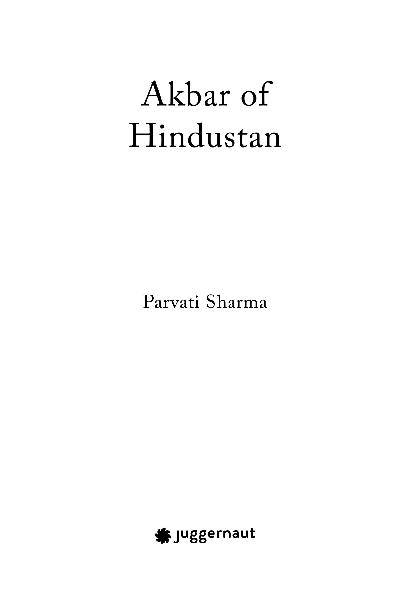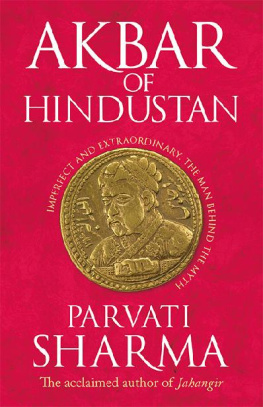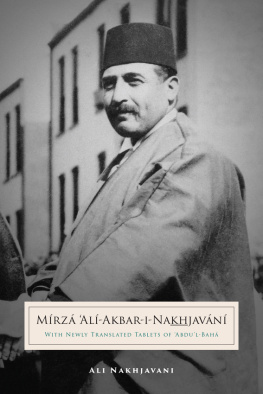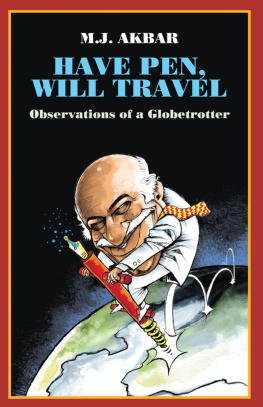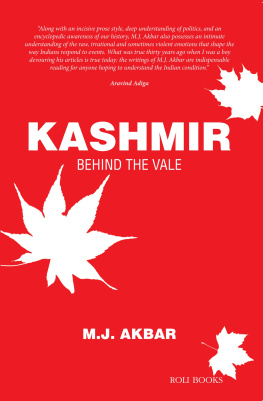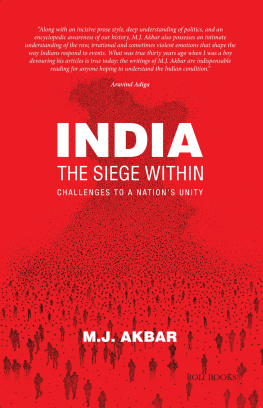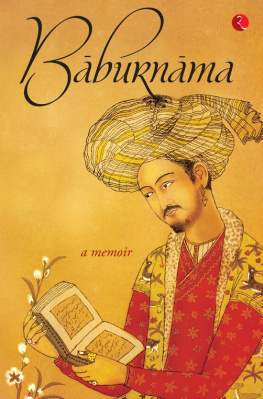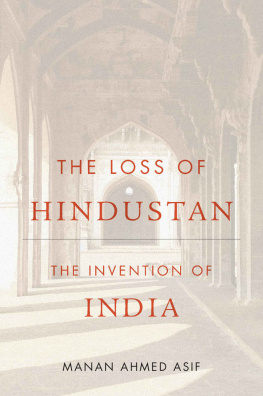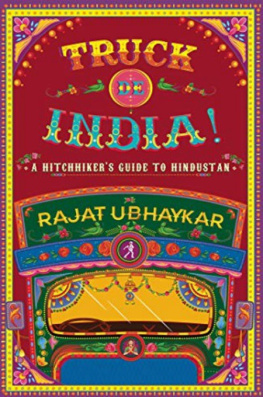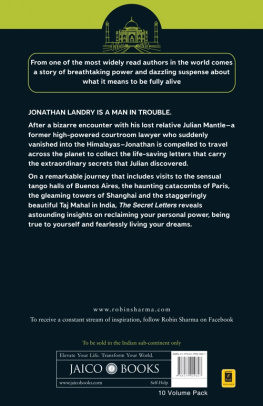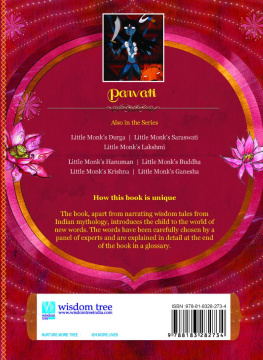For Shahrukh
who is also quite great
Cast of Characters
Jalaluddin Muhammad Akbar: Third Mughal emperor. Ruled for just short of fifty years (15561605) and built the empire that bears his dynastys name
Family
Babur: Akbars grandfather. Ruled in Fergana, Kabul and very briefly Agra, where he laid the foundations of his familys ambitions in Hindustan
Maham Begum: Baburs wife, Humayuns mother (not to be confused with Maham Anaka, Akbars nurse)
Khanzada: Baburs sister and trusted adviser to all four of his sons
Haider: Baburs cousin, Humayuns uncle. Commander and adviser
in Humayuns court. Left to conquer Kashmir after Humayuns exile from Hindustan. Wrote a history of the Moghuls of Central Asia, the Tarikh-i Rashidi
Humayun: Baburs eldest son, Akbars father. Lost Hindustan to Sher Shah Suri. Managed to reclaim his throne but died only months afterwards, leaving thirteen-year-old Akbar to inherit his conquest-in-progress
Hamida: Akbars mother. Married Humayun, with reluctance, during his exile. Had Akbar when she was about sixteen and lived almost to the very end of his life and reign. Was deeply loved, respected and trusted by her son
Muazzam: Hamidas brother and Akbars uncle. Eccentric, unreliable and increasingly violent, was eventually imprisoned by Akbar
Kamran: Akbars uncle, Humayuns half-brother. Usually the villain in stories of Humayuns life
Askari: Akbars uncle, Humayuns half-brother, Kamrans full-brother and his unimpressive second-in-command
Hindal: Akbars uncle, Humayuns youngest half-brother. Brave, chivalrous and greatly mourned by his sister, Gulbadan
Yadgar Nasir: Humayuns cousin. Plotted against Humayun once too often, executed at Humayuns orders
Gulbadan: Akbars aunt, Humayuns sister. Lived to old age in Akbars empire. Made an adventurous journey to Mecca, and wrote an enjoyable account of Humayuns reign and exile, the Humayun-nama
Dildar: Hindals mother. Persuaded a reluctant Hamida to marry Humayun, despite Hindals objections to the match
Sultan Begum: Askaris wife and affectionate guardian to Akbar when he was held hostage by Askari
Mahchuchak: Humayuns youngest wife and mother of his second son, Hakim. Fiercely protective of Hakims (and her own) right to rule Kabul
Hakim: Akbars half-brother and embattled ruler of Kabul. Was proclaimed an alternative to Akbar more than once by disenchanted warlords in Hindustan
Faridun: Hakims uncle. Blamed by Mughal historians for instigating Hakims incursions into Hindustan
Khwaja Hasan Naqshbandi: A descendant of the Naqshbandi Sufis. Among Hakims closest advisers. Married Hakims sister
Abul Qasim: Kamrans son and Akbars cousin. Kept imprisoned and possibly executed by Akbars command
Sulaiman: Humayuns cousin, Akbars uncle. Replaced Humayun as governor of Badakhshan, then became its ruler. Long hoped to rule Kabul, spent his last days as Akbars refugee-guest in Lahore
Haram: Sulaimans formidable wife, said to be the real ruler of Badakhshan
Shahrukh: Sulaimans grandson, Akbars nephew. Became a rival for Sulaimans throne in his teens, later joined Akbars court
Sharafuddin: A distant Timurid relative who came to offer his congratulations to young Akbar, remained to marry Akbars sister, then rebelled against him
Mirza Ibrahim Husain: Best known of The Mirzas a clan of Timurids who were frequently guilty of insubordination, and worse, to Humayun and Akbar. Ibrahim was married to Kamrans daughter, Gulrukh
Mirza Muhammad Husain: Mirza Ibrahim Husains brother. Remembered for his shock when he heard that Akbar had chased after him from Fatehpur Sikri to Ahmedabad in nine days. Was defeated in the battle that followed
Bihari Mal: Embattled heir to the Kachhwaha throne. Became Akbars first Rajput ally and father-in-law when he married his daughter, Harkha, to Akbar
Harkha Bai: Kachhwaha princess, Akbars first Rajput wife and mother of his first son, Salim
Bhagwant Das: Harkhas brother and Akbars brother-in-law. Attained high rank in Akbars court; married his daughter to Akbars firstborn son (also Bhagwant Dass nephew)
Man Singh: Harkhas nephew and brother-in-law to Akbars firstborn son. One of Akbars star generals and among the most powerful men in his court
Salim: Akbars eldest son. Born of Harkha as the boon Akbar sought from God, Salim became the bane of Akbars old age. Led the last prominent rebellion against Akbar and succeeded him as Jahangir
Man Bai: Salims first wife, Bhagwant Dass daughter, and mother to Salims first son, Khusro
Salima Sultan: Akbars cousin, Bairam Khans widow and thereafter Akbars wife. A trusted adviser to the family, played a key role in negotiations between Akbar and Salim
Murad: Akbars second son. A favourite of his Jesuit tutor Father Antonio Monserrate, unpopular with Akbars nobility. Died while Akbar lived
Daniyal: Akbars youngest son. Enjoyed hunting, horses and poetry. Died while Akbar lived, despite Akbars desperate efforts to save him
Khusro: Salims first son. A favourite of Akbars and a contender for his throne
Foster Family, Family Friends and Frenemies
Maham Anaka: Generally, and incorrectly, said to be Akbars foster mother; more likely the superintendent of his nurses. Loving, protective and ambitious, she played a prominent role in the early years of Akbars reign
Adham Khan: Maham Anakas son. Memorably and brutally executed by Akbar for murdering Akbars foster father
Shamsuddin Muhammad Ataka: Akbars foster father and his attendant from Akbars infancy. Loyal and ambitious, rose to a high rank during Akbars reign before being killed by Adham Khan. His family remained powerful and became known as the ataka khail clan of the ataka
Jiji Anaka: Wife of Shamsuddin and one of Akbars most beloved foster mothers
Aziz Koka: Son of Shamsuddin and Jiji. Akbars milk brother, best friend and most outspoken critic
Zain Khan Koka: Another of Akbars milk brothers. Best known for leading imperial troops against the Afghans of Swat and Bajaur and losing control of the campaign in which Birbar perished
Shihabuddin Ahmad Khan: Maham Anakas friend, relative and second-in-command. Served in Akbars court for decades after Maham Anakas death
Abul Maali: A great favourite of Humayuns; of handsome appearance and villainous nature. Plotted against Akbar and his family, briefly held the throne of Kabul
Bairam Khan: Became Akbars regent when Humayun died. Without him, Akbar might not have had an empire in Hindustan. Generous, ambitious and sometimes vengeful, was ousted in a coup led most likely by Maham Anaka
Abdur Rahim: Bairam Khans son. Orphaned at age four when Bairam Khan was murdered, brought up by Akbar in whose court he rose to Bairam Khans rank of khan-khanan khan of khans
Husain Quli Khan: Bairam Khans nephew. Once disparaged by Akbar for not having fought so much as a chicken, his father was executed for supporting Bairam Khans rebellion. Rose to high rank as governor of both Punjab and the east, yet never seems to have gained Akbars affection, and was mistrusted by some of Akbars Sunni warlords because he was Shia
Tardi Beg: A tight-fisted but ultimately loyal warlord who served Humayun and very briefly Akbar. Was executed at Bairam Khans command
Munim Khan: Akbars ataliq guardian when Akbar was a prince. Allied with Maham Anaka against Bairam Khan. Led Akbars conquests into Bihar and Bengal, battling on Akbars behalf into his eighties
